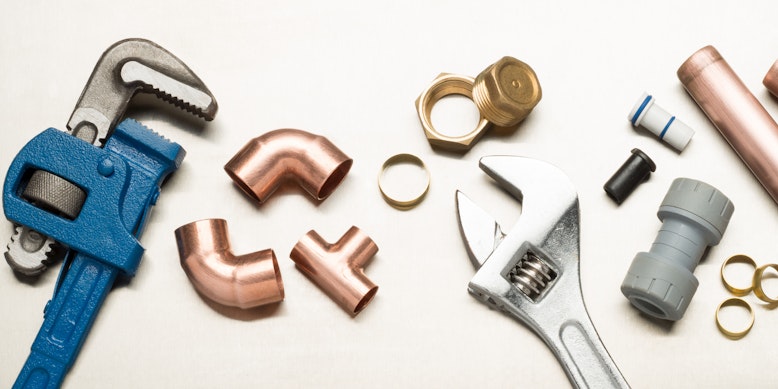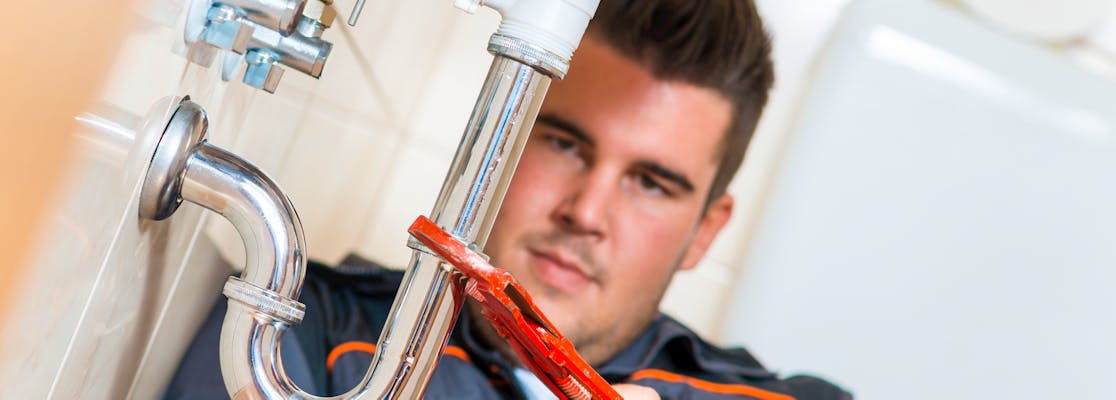A Study Guide to the Plumbing Aptitude Test: and Tips
Updated November 20, 2023
- What Is the Plumbing Aptitude Test?
- The Two Main Plumbing Apprenticeship Tests
empty
empty
empty
empty
empty
empty
empty
empty
empty
empty
empty
empty
- Plumbing Aptitude Test Practice Questions
empty
empty
empty
empty
empty
empty
- Alternative Plumbing Aptitude Tests
empty
empty
empty
empty
empty
- How to Prepare for Your Plumbing Apprenticeship Test
- Frequently Asked Questions
- Final Thoughts
A plumbing aptitude test is a measure of the core skills and abilities required for the plumbing profession. These plumbing apprenticeship tests are typically used for admission to plumbing apprenticeships and training programs, and test your verbal, numerical, spatial and mechanical reasoning skills.
If you’re interested in a career as a plumber, it’s highly likely that you’ll be required to take a plumbing aptitude test to be accepted onto a training program or apprenticeship.
Read on to learn more about what these tests involve and how best to prepare for them.
What Is the Plumbing Aptitude Test?
To become a successful plumber, individuals must demonstrate proficiency in various areas that are seen as essential for the job – areas like math, problem solving and mechanical comprehension.
The plumbing aptitude test is an assessment designed to evaluate these skills and is typically administered by the Plumbers Union or other relevant organizations responsible for overseeing plumbing apprenticeship programs.
It’s important to note that there isn’t one single plumbing aptitude test. In fact, there are several assessments used to screen apprenticeship candidates for these specific skills.
Prepare for the Plumbing Aptitude Test with JobTestPrep
The Two Main Plumbing Apprenticeship Tests
There are two main entrance tests commonly used for plumber apprenticeships. Which one you take will depend on where you live.
In the US, the most common test is the Plumbers Union Aptitude Test. This is administered by GAN Human Resources, an organization that offers testing solutions for union apprenticeship programs across the country.
In the UK, it is the BPEC Aptitude Test administered by the British Plumbing Employers Council (BPEC). Taking this test is a prerequisite for anyone pursuing a place on a BPEC certification course.
Below you’ll find more details on each plumbing apprenticeship test and the types of questions they contain.
Both the Plumber Aptitude Test and the BPEC Aptitude Test aim to evaluate crucial skills and knowledge necessary for the plumbing profession.
If you’re required to take either, it’s important to familiarize yourself with the content and format so you can fully prepare and increase your chances of a high score.
The Plumbing Aptitude Test
The Plumbing Aptitude Test is a comprehensive exam with 140 questions across six different topics and a total time limit of 120 minutes.
The questions you’ll find on the Plumbers Union apprenticeship test are:
Reading Comprehension
The reading comprehension section evaluates your ability to read and understand written passages of text and to draw logical conclusions from the information you’re given.
There are 42 multiple choice questions here, with a 25 minute time allowance.
Numerical Computation
The numerical computation section requires you to perform numerical calculations involving fractions and decimals, without the use of a calculator.
You’ll have just 24 minutes to answer 28 questions, so your ability to work with accuracy at speed will also be tested.
Numerical Reasoning
The numerical reasoning questions test your ability to spot numerical patterns, with each one presenting a number series.
You’ll need to complete each series by picking the right multiple choice option, with 10 questions to work through in 10 minutes.
Folding
In the folding section, you're given a series of two dimensional schematics and are required to mentally manipulate them into three dimensional shapes. There are 12 questions and a 15 minute time allowance.
Problem Solving
Here, you’ll be presented with a series of mathematical word problems, which you’ll need to convert into numerical problems and solve. You’ll have 35 minutes to answer 35 questions.
Mechanical Comprehension
Finally, the mechanical reasoning section tests your understanding of mechanical and physical principles and how to apply them. It has a 13 minute time limit with a total of 13 multiple choice questions.
The BPEC Aptitude Test
The BPEC Aptitude Test is designed to test a range of core skills in a work-based context, with questions replicating problems you’re likely to encounter as a qualified plumber.
As with the Plumbers Union Aptitude test, it is a timed, multiple choice exam, which you’ll need to complete in 45 minutes.
The sections covered in this plumbing apprenticeship test are:
Verbal Comprehension
The verbal comprehension questions look at your ability to interpret written language. You’ll need to pick out key details from various texts relevant to the job, such as technical instructions and safety guidelines.
Numerical Reasoning
The numerical reasoning section covers numerical interpretation as well as basic math skills.
Problems presented include things like time conversions, monetary calculations and geometry-based questions.
Spatial Reasoning
In the spatial reasoning section, you’re tasked with shape visualization and manipulation. Questions may ask you to visualize 2D shapes in 3D or identify a physical shape based on a blueprint.
Mechanical Reasoning
Plumbing mechanical aptitude test questions measure your practical knowledge of things like motion, fluid mechanics and tools and equipment.
Plumbing Aptitude Test Practice Questions
Reading Comprehension
The plumbing industry has seen a significant surge in eco-friendly practices and technologies over the past decade. As concerns about environmental impact grow, plumbers are increasingly seeking sustainable solutions for water management and waste reduction. This shift has led to a number of challenges in the plumbing sector, particularly in navigating relevant regulations and codes. While eco-conscious plumbing practices continue to expand, existing plumbing codes have not fully adapted to these green advancements, resulting in a lack of clarity on how to apply them.
Which of the following statements regarding eco-friendly plumbing practices is correct?
a) Eco-friendly plumbing practices have had little impact on the plumbing industry.
b) The plumbing sector has effectively addressed all legal challenges related to eco-friendly technologies.
c) Plumbers have encountered difficulties in implementing eco-friendly practices due to outdated plumbing codes.
d) Existing plumbing regulations have seamlessly integrated eco-conscious solutions into their framework.
Convert the fraction 5/8 into a decimal.
a) 0.5
b) 0.625
c) 0.75
d) 0.8
What is the missing number in the following number series?
4, 7, 10, 13, _?_, 19
a) 15
b) 16
c) 16.5
d) 18
What would the cube look like when folded?

A plumber is tasked with calculating the total length of pipes required for a water supply system in a building. The plumber needs to connect three sections of pipes, each measuring 4.5 meters, 3.2 meters and 6.8 meters, respectively.
Additionally, there is a pipe section of 2.7 meters required for another connection.
What is the total length of pipes needed for this water supply system?
a) 14.2 meters
b) 13.7 meters
c) 16.2 meters
d) 17.3 meters
A homeowner is experiencing a slow drain in their kitchen sink. They suspect a blockage in the pipe. To investigate, they remove the P-trap (U-shaped pipe) underneath the sink and find it clogged with debris.
If the slow drain issue persists even after cleaning the P-trap, what could be some other potential causes of the problem, and how would you troubleshoot them as a plumber?
a) Clogs further down the drainpipe: Use a plumbing snake or auger to clear the drainpipe
b) Issues with the vent system: Check the vent for obstructions or damage and clear as needed
c) Pipe damage: Inspect the pipes for cracks or damage and repair or replace as necessary
d All of the above
e None of the above
Alternative Plumbing Aptitude Tests
In some cases, you may be asked to take an alternative or additional plumbing aptitude test to those we’ve covered.
These tests include:
Critical Basic Skills Test
The Critical Basic Skills Test is a measure of fundamental verbal and math skills required for plumbing. This test usually has around 40 questions with a 20 minute time frame.
Customer Service Aptitude Profile
This is an assessment of your interpersonal and customer service skills. Employers use this test to ensure you have the attributes required for building positive customer relationships.
Workplace Productivity Profile
This plumbing apprenticeship test looks at your work ethic and values. It helps employers evaluate your trustworthiness, dependability and professional standards.

If you need to prepare for a number of different employment tests and want to outsmart the competition, choose a Premium Membership from JobTestPrep.
You will get access to three PrepPacks of your choice, from a database that covers all the major test providers and employers and tailored profession packs.
Wiesen Test of Mechanical Aptitude
The Wiesen Test of Mechanical Aptitude looks at your understanding of mechanical concepts and your skill for working with various equipment and machinery. You’ll have 30 minutes to complete 60 questions.
Further Mechanical Aptitude Tests
Depending on the specific employer or apprenticeship program, you may need to take an additional plumbing mechanical aptitude test.
The plumbing mechanical aptitude tests look specifically at your knowledge and proficiency in mechanical concepts relevant to the plumbing industry.
How to Prepare for Your Plumbing Apprenticeship Test
These tests play a pivotal role in your first steps toward a plumbing career, so you need to take them seriously.
To give yourself the best chance of a high score, it’s important to put in plenty of plumbing aptitude test practice and prepare accordingly.
Step 1. Revise Basic Principles
No matter the version you take, a plumbing aptitude test does not require any prior knowledge. It does however require you to have a strong grasp of fundamental principles, so this is a good place to start.
Brush up on math concepts such as fractions, decimals, percentages, and basic algebra, and strengthen your verbal comprehension skills by reading various texts like plumbing-related manuals and technical documents.
You can also engage in problem-solving exercises to sharpen your analytical abilities.
Step 2. Take Plumbers Apprenticeship Aptitude Practice Tests
Past papers, sample tests and plumbing aptitude test practice questions should all feature in your study plan. These resources will offer valuable insights into the test format, types of questions asked and the time constraints involved.
Regularly attempt these plumbers apprenticeship aptitude practice tests under exam conditions. Track your progress as you go to identify areas you find difficult, and focus on improving your performance in those sections.
Step 3. Check Your Equipment
If you’re issued a computer-based test to take remotely, make sure everything you need is in working order, particularly your internet connection.
If taking your plumbing aptitude test at a designated test center, make a checklist of permitted items you need to take, such as a calculator, and ensure you have everything ready for a smooth test day experience.
Step 4. Join Study Groups
If you’re someone who enjoys learning in a classroom environment, consider joining a study group or online forum designed for plumbing apprenticeship aptitude test practice.
Engaging in discussions, sharing study materials and exchanging ideas can offer valuable learning opportunities. It can also expose you to different problem solving approaches and test taking strategies.
Step 5. Focus on Well-Being
As well as building on your skills, it’s important to take care of your physical and mental well-being throughout your preparation period.
Aim for adequate sleep each night, as a well-rested mind is more receptive to learning and retaining information. You should also maintain a balanced diet and engage in regular physical exercise to reduce stress and enhance cognitive abilities.
The plumbing aptitude test, sometimes referred to as the plumbers and pipefitters aptitude test, is an assessment conducted by the Plumbers Union or other relevant organization to evaluate the skills and knowledge of individuals wanting to become plumbers.
It measures abilities in areas such as math, reading, problem-solving, mechanical comprehension, and spatial reasoning, helping to determine if candidates have the aptitude required to perform the daily tasks involved in plumbing work.
By assessing these key skills, the test helps employers select those who are well-prepared and capable of succeeding in a plumbing apprenticeship or career.
The plumbing aptitude test assesses candidates in various areas essential to the plumbing profession, including math, reading comprehension, problem-solving, mechanical comprehension and spatial reasoning.
Some of the things you’ll be tested on include your ability to perform calculations, interpret written instructions and blueprints, solve problems, understand basic mechanical principles and visualize three-dimensional shapes from two-dimensional schematics.
There are various resources that can help you prepare for your plumbing aptitude test, including textbooks, online tutorials, and study guides that cover the key subjects tested.
You can also use sample questions and past papers to improve both your knowledge and test taking skills.
For the best preparation materials, use sites like JobTestPrep where you’ll find a full practice plumbing apprenticeship aptitude test.
The plumbing aptitude test is designed to measure core skills needed for the profession, so if you’re well suited to the role it should be well within your means.
That said, test day stress and time constraints can add to the challenge, particularly if you get nervous under exam conditions.
Plenty of practice and proper preparation will help here.
We’ve provided a number of sample questions from different areas of the plumbing aptitude test in this article to help you get started with your preparation.
When you’ve worked through these we recommend you visit JobTestPrep where you’ll find a comprehensive question bank specifically designed for plumbing apprenticeship aptitude test practice.
In a plumbing apprenticeship interview, it’s important to highlight your passion for plumbing, relevant experience and skills, and your willingness to learn.
Whatever questions you’re asked, try and emphasize your work ethic, problem-solving and teamwork abilities. You should also show your understanding of the responsibilities of a plumbing apprentice and your commitment to safety and quality work.
Additionally, be prepared to ask thoughtful questions about the apprenticeship program or the company to showcase your interest and engagement.
Math is an essential skill for plumbers as it's used frequently for things like measuring pipe lengths, calculating angles, determining water flow rates, and estimating material quantities.
Math is also necessary for reading blueprints, interpreting technical drawings, and performing calculations for plumbing installations and repairs.
If you have hopes of becoming a plumber, you should be confident in your ability to work with fractions, decimals, ratios, and conversions.
While some basic plumbing skills can be self-taught, becoming a professional plumber requires formal training.
You’ll typically need to complete an apprenticeship, where you’ll acquire knowledge of building codes and regulations and gain hands-on experience under the guidance of experienced mentors.
You’ll also need to obtain the appropriate licenses and certifications for where you intend to work.
While the exact duration will vary depending on the specific exam you take, you’ll be given a set amount of time to complete your plumbing aptitude test.
This time limit is there to assess how well you work under pressure, so it’s a good idea to take your plumber's apprenticeship aptitude practice tests under timed conditions.
This will help you balance speed with accuracy and improve your time management skills.
It’s hard to set an exact range for a good score on a plumbing aptitude test, as it varies depending on the exact test you take and the standards set by the administering organization.
A general rule of thumb for any aptitude test, however, is that a score in the 80th percentile or above would be seen as competitive.
Ultimately, a good score is one that reflects your very best efforts, and it’s important to not put too much pressure on yourself as it may impact your performance.
A plumbing aptitude test serves as a screening tool for apprenticeship programs, helping to identify applicants who have the necessary skills and knowledge to excel in the profession.
It measures abilities across verbal, numerical, spatial, and mechanical reasoning, all of which are necessary to perform the tasks and responsibilities of a plumber effectively.
JobTestPrep offers a comprehensive preparation pack designed for the plumbing aptitude test.
This includes sample questions, practice tests and study tips to help you build your skills base and improve your confidence for test day.
Final Thoughts
The plumbing trade requires a good level of knowledge and skill, and a plumbing aptitude test is an effective way for organizations to measure your abilities. It also gives them insight into your future potential, helping them select the very best candidates for apprenticeship programs.
Understanding what these tests involve is the first step towards a good performance.
By taking plenty of practice tests and following the study tips outlined above, you can approach your plumbing apprenticeship test with confidence and readiness.
An effective and focused preparation plan will increase your chances of performing well, helping you start your journey towards a successful career as a plumber.


